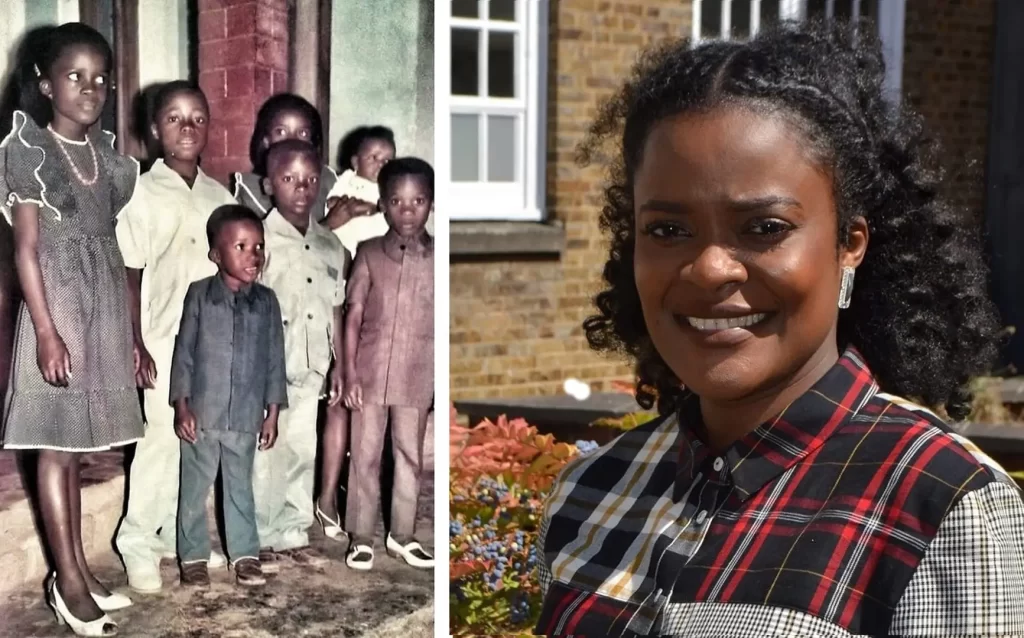Congolese refugee has ‘purpose in life’ after gaining job in childcare

Rebecca Mbele, from Tottenham, tells how she fled war-torn Congo to start a new life in the UK and secured her lifelong dream of working with children.

Growing up in the Democratic Republic of Congo, Rebecca Mbele would often care for her younger siblings and children of relatives and family friends at the age of 10.
Despite a rich wealth of minerals and natural resources, DRC is one of the poorest countries in the world following years of civil and international war from 1996-97 and 1998-2003. The conflicts and their aftermath have caused millions of fatalities amid continued unrest.
Rebecca lived with her parents, older sister and three younger brothers in the capital Kinshasa, the largest city in Africa with a population of 15 million. She is proud of her Congolese roots and recalls a happy childhood and enjoyed looking after her younger siblings and other children when they came to visit. Together they would play games, make dolls, pretend to cook, draw pictures and sing.
“The men would watch TV and discuss the news and politics and the women would be in the kitchen, and I would sit in a corner and play with the children. I felt honoured that their parents trusted me to look after their little ones,” said Rebecca, 44, who now lives in Tottenham.
According to Unicef, 7 million children in the DRC aged 5 to 17 are not in school due to the cost – despite the country’s government decreeing primary education should be free – and the vast majority of the country’s children have no pre-school education.
“There is an African proverb that says it takes a village to raise a child,” said Rebecca.
“There aren’t many places your parents can leave you when they go to work, so you would stay with a relative, neighbour or family friend in the community. For your children to go to a nursery, you had to be earning a lot of money. It was not an option for us.”
Rebecca left school in 1995 aged 18 after passing the Examen d’Etat, the Congolese equivalent of the French baccalauréat, and began studying economics at Université William Booth in Kinshasa.
Civil war broke out in DRC the following year with the country in political turmoil and economic decline, which spilled over into Uganda and Sudan. The conflict escalated when Rwanda invaded DRC and was later joined by more states including Uganda, Burundi, Angola and Eritrea.
Despite only lasting seven months, the war caused widespread destruction with hundreds of thousands of people killed or displaced. Rebecca’s family were forced to move further out of Kinshasa and she had no choice but to give up her studies.
She said: “The lifestyle we had was gone. I could feel it in the house. The country was getting worse and worse and there were fewer jobs. If you didn’t know people, you didn’t get work. I was crying on my bed every single night thinking, what is this life?”
During her studies, Rebecca met and got engaged to another student. He was also a political activist wanted by the Congolese government and fled the country in 1996.
“For a whole year, there was no communication. No one heard from him or knew where he was. I was sad, confused and deeply worried. I thought it was finished and he was gone,” she said.
His aunt in the UK later wrote to tell his family he had arrived as a refugee and was safe.
The first war came to an end when President Mobutu was overthrown but political tensions and hostility continued under rebel leader Laurent-Desiré Kabilia, leading to the second conflict that would last five years. Fearing for her safety, Rebecca flew to the UK to be with her fiancé.
They set up a home in Camden and arranged a traditional Congolese wedding and would go on to have four children. Attending baby clubs and nurseries with her children further sparked her interest in an education career.
She said: “I’m so glad they went. It helped them to communicate with other children, how to play and share toys. At that age, it is so important for their development. I would see how the staff set things up and would get down to the children’s level to speak to them. It was amazing to see, and I knew that this was what I wanted to do.”
Rebecca enrolled on an Early Years Practitioner Level 2 Diploma at the College of Haringey, Enfield and North East London (CONEL) and went on to study Supporting Teaching and Learning Level 3 Certificate. She received an Excellence Award from CONEL in 2018.
She is now working for N Family Club, an early years education provider with nurseries across London and the South East, having started her career at Pembury House Nursery School and Children’s Centre in Haringey where she undertook a placement while at college.
Rebecca said: “CONEL gave me the chance to truly believe in myself and prepare for my dream career. I was blessed to have had the most amazing, kind and caring teachers. I am so proud and amazed when I look at what I have achieved. I now know where I am and where I am going. I am happy and have a purpose in my life, and nothing can stop me.”
Apply now for Childcare and Early Years courses.

King’s Cross
London
WC1X 8RA
United Kingdom Contact Us


